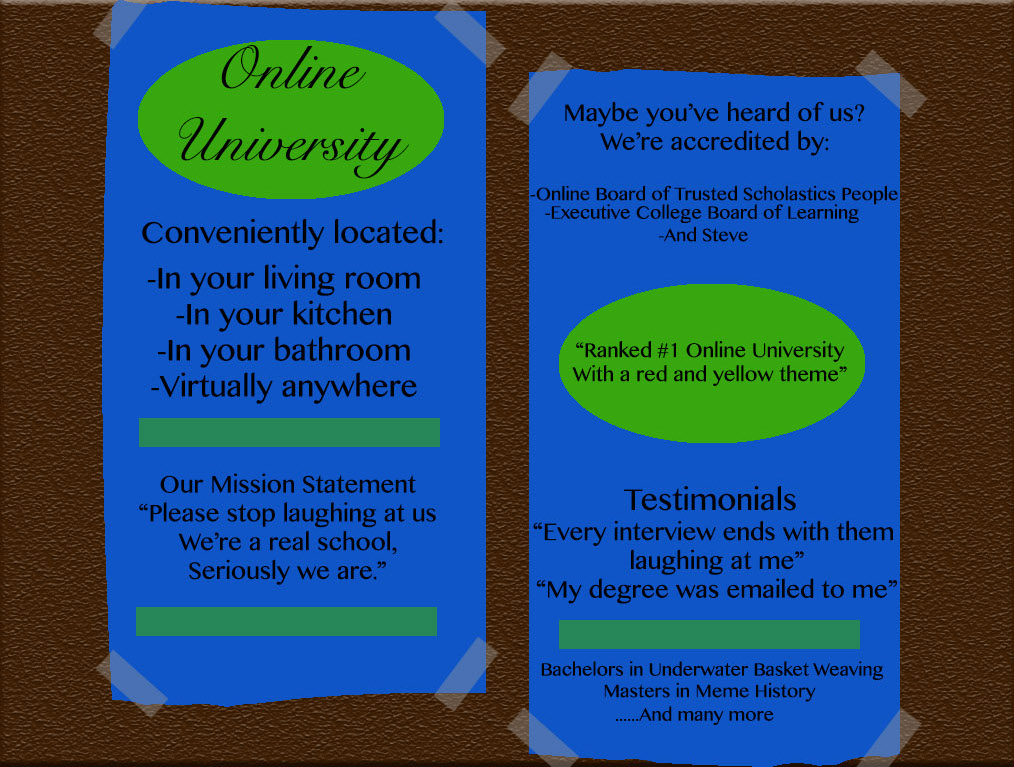
Online degrees lack social skill development

The National Center for Education Statistics reports that in fall 2014, more than 5.7 million Americans were enrolled in postsecondary distance learning courses. Offering flexibility with students’ work schedules and child care schedules, online degree programs can be a convenient option, but do they carry the same value as having a traditional degree from an established university?
That convenience comes at a price. Without the campus environment, online degree holders may miss out on an important part of the higher education experience. Online programs lack social skill development through interpersonal connections, teamwork opportunities and the interaction with instructors that brick and mortar schools offer.
Classmates play an important role in education. Gathering together with peers to learn material and study for tests helps students see concepts from different perspectives. It also allows students to build a network of future colleagues in their industry and learn about the many different career paths available with their major through fellow students’ work and internship experiences. Just as tackling challenges with classmates is important, being challenged by classmates is equally necessary for a well-rounded education. Healthy disagreements and difference of opinion can lead to more in-depth discussions in a classroom than an online forum.
U.S. News and World Report reports that only two percent of students in U.S. based online degree programs are international students. This limits exposure to diversity in a global marketplace. Learning to work together with people from different backgrounds to accomplish goals is a key factor to career success. While there can be some group projects in online classes, meeting virtually does not cultivate the same teamwork skills as working face-to-face does, especially when it comes to presenting and discussing your work with peers.
Furthermore, the age-old discussion of human versus machine has posited whether computers will fully replace teachers for decades. The truth is that there is just something missing without face-to-face interaction with instructors. Instructors offer insight into the industry and try to model the classroom environment to best prepare students for a career. Though some professors can offer online office hours, discussions held outside of class time with face-to-face assistance can reinforce and improve understanding of the course.
U.S. News also reports the average age of students in online bachelor’s degree programs is 32. The reality is that the traditional four-year, on-campus education may not be possible for everyone due to a variety of factors. However, the freedom of online classes at the very least comes at the cost of soft skill development in the classroom that prepares you to be a successful employee.
Balancing an on-campus education with a work and home life also signifies to employers that an applicant has strong time management and organizational skills. Many online degrees offer a work-at-your-own-pace plan that does not prepare students for their time in the workforce where most positions are fast-paced and deadline oriented.
An on campus education brings a level of interaction similar to what one would find in a typical office environment. While employees might communicate with clients or customers via email, they still have to be able to efficiently communicate with fellow coworkers in the office. The social skills gained on a college campus prepare students to be potential employees just as much as a class could.
The ideal 21st century education includes a balance between online and in-person instruction. Although online degree plans may be more convenient for some that have a full-time job or children, the soft skills gained on campus are lost when classes are moved completely to an online format.

I prefer speaking to students rather than typing at them.
Social skills are important in the workplace.